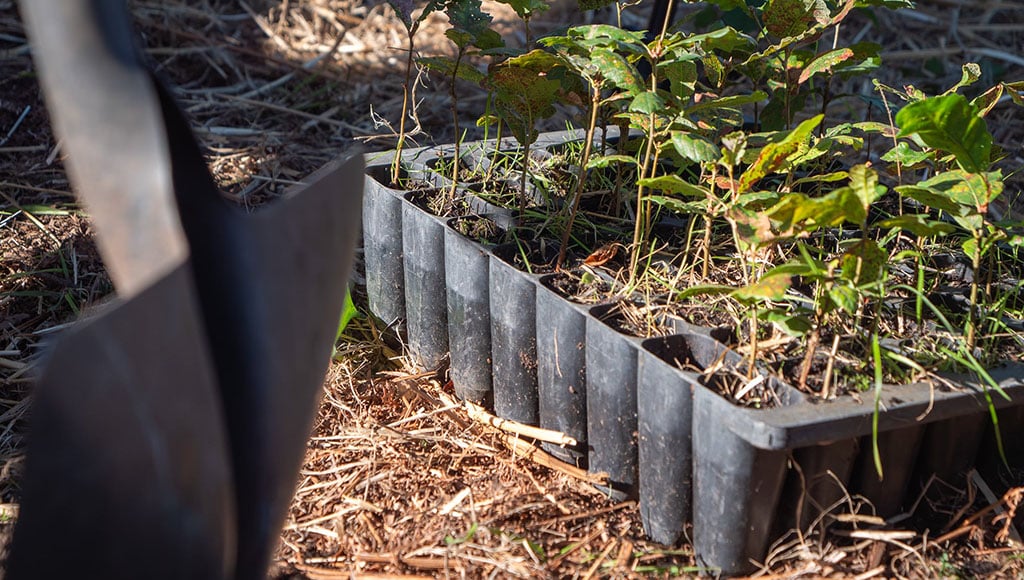Project revived to help restore the Monchique mountain range’s biodiversity
The Renature Monchique project has been revived with the goal of planting another 125,000 trees in the Monchique mountain range.
Originally launched in 2019, the project aimed to help replant vast areas of the Monchique borough devastated by a massive wildfire in 2018.

As a direct result of the project, 260,000 native trees have already been planted, and around 60 landowners and producers have been supported.
The project – which is a joint effort between Ryanair, the Group for Spatial Planning and Environment Studies (GEOTA), the Algarve Tourism Region (RTA), the Institute for Nature Conservation and Forests (ICNF), and the Monchique Municipal Council – has now been relaunched in order to expand upon these results.
The relaunch event took place on Thursday (November 23) with the planting of five Monchique oak trees, a species classified as “critically endangered.”
“Due to successive fires and other threats affecting the Monchique mountain range, it is estimated that only 250 Monchique oak trees (Quercus canariensis) remain. As a species that naturally grows in Portugal only in the Monchique mountain range and the Mira basin, protecting it through the planting of new trees is one of the main goals of the project,” says a statement released by GEOTA.
Over the last four years, GEOTA says it has been empowering and encouraging landowners to actively manage their forest properties.
“We work very closely with landowners so that they can, with our support, protect the ecological and economic value of their region through a native forest. The most planted species are cork oak and strawberry tree because they occupy the largest area in the Monchique mountain range and are of greater economic interest to landowners. We believe that this is one of the ways we can increase the forest’s resilience not only in Monchique but throughout the country,” says Judite Fernandes, vice president of GEOTA.
The project is now entering its fifth year with the largest funding since its launch: €400,000 euros, secured by Ryanair. This amount will allow the planting of an additional 125,000 native trees by April of next year. In total, the investment in the Monchique mountain range amounts to €1.4 million.
“Ryanair is proud of the work carried out as part of the Renature Monchique project. Restoring the forest in the Monchique mountain range and preventing land degradation are the goals of our company and our passengers. Through the planting of 125,000 new trees, we hope to continue actively contributing to the forest’s resilience,” says Thomas Fowler, Director of Sustainability at Ryanair.
Meanwhile, the President of RTA has describes Renature Monchique as a “successful example of a public-private partnership” which has contributed to the “preservation and enhancement of Monchique’s natural assets.
“It is also an example of responsible environmental policy from Ryanair, whose carbon offset programme allows supporting initiatives as meritorious as this, helping to reforest the areas of the mountain range most affected by the fire that consumed over 27,000 hectares of forest and agricultural land in 2018. Renature Monchique managed to turn a tragedy into an opportunity for sustainable forest management and protection of the wealth of the inland landscape, and therefore, we hope the project will continue for more years. RTA will do everything it can towards this goal,” says Gomes.
The project has also been celebrated by Paulo Alves, Mayor of Monchique, who states that “consistent support for private management of the forest areas that occupy the majority of Monchique’s territory is necessary.”
He says that the municipality’s involvement in this project aims to “encourage the community to recover their properties after the fire, making the forest more biodiverse, resilient to rural fires, and sustainable.
“We know, for example, that the planting of strawberry trees promotes forest resilience, ensures the raw material for the production of strawberry tree brandy, and simultaneously generates the wealth necessary for managing these stands,” he adds.
ICNF has also been a firm supporter of the project from the outset, saying that it is “important for increasing the biodiversity and resilience of the Monchique mountain range and encourages citizens to participate in the management of natural spaces,” says António Miranda, Deputy Regional Director of ICNF Algarve.

michael.bruxo@portugalresident.com


























